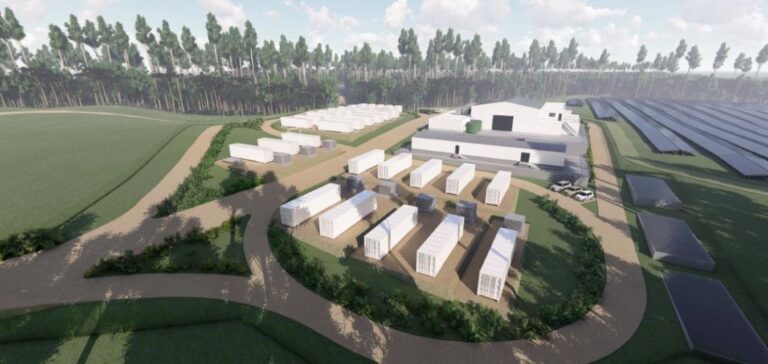Construction of the West Guyana Power Plant (CEOG) resumed a few weeks ago, and with it the mobilization of a nearby Amerindian village, which has no intention of letting the project “kill the forest” and “destroy” its “living space”.
Growing protest over the West Guyana Power Plant at Prospérité
Protected by a large deployment of law enforcement officers – some 80 gendarmes equipped with quads and drones – the workers resumed deforestation operations in mid-August in this area of western French Guiana, in the commune of Mana. Begun in November 2022, work was interrupted for five months during the rainy season, with CEOG citing “technical and meteorological constraints”. A photovoltaic power plant is due to be built here, which will eventually supply 10,000 homes with electricity via a hydrogen-powered energy storage technology.
The 200 inhabitants of the Kali’na Amerindian village of Prospérité (or Atopo Wepe), located two kilometers from the site, are actively contesting the project, which is backed by the Meridiam investment fund. They consider the plant to be too close to residential areas and have been calling for years for an alternative location.
“We fight with pieces of wood. They (the authorities) with grenades that they throw 200 meters. The fight is unbalanced. A lot of resources are deployed to fight against our minority. All this to kill the forest and destroy the living space of 200 people”, Roland Sjabère, the village’s customary chief, lamented to AFP.
LDH supports Village Prospérité in its dispute with CEOG
Village Prospérité has received the support of the Ligue des droits de l’Homme (LDH).
“No development project, no matter how necessary, can be carried out without respecting the rights of indigenous peoples, their ancestral customs, their ties to the land and their interactions with their environment,” stressed the human rights organization in a press release last March.
In response, the director of CEOG says he is “well within the bounds” of the law.
“We are authorized and legitimate to carry out this work. If we weren’t, we would have been arrested,” Henry Hausermann told AFP.
The manufacturer, backed by the French government and a large majority of local elected representatives, insists that “it is impossible to move the project”. After several attempts at mediation, the situation seems to have reached an impasse. And tensions, already high at the end of 2022 after Chief Sjabère was taken into custody following damage to the site, have been rekindled with the resumption of work.
Three lawsuits in one year supported by Village Prospérité against CEOG
Despite this tense context, there have been no injuries or arrests since mid-August. But Roland Sjabère fears for the future.
“There’s a need for appeasement and de-escalation because violence is increasing. We want to avoid this kind of drama,” he stresses.
This message was heard by the new prefect, Antoine Poussier, who arrived in French Guiana on August 21, and visited Prospérité on Thursday to meet with customary authorities. At the same time, the village association is continuing its legal battle. She summoned the CEOG before the Cayenne judicial court for “manifest neighborhood disturbance”.
An initial hearing took place on Friday.
“It’s a legal procedure that can stop the work, not just suspend it”, says Roland Sjabère, for whom it’s important to get recognition for the impact that the CEOG would have on “women, men and children”, and not just on “nature and animals”.
This is the third legal action taken against the power plant project in less than a year, following a criminal complaint for environmental damage filed in November and dismissed in May, and an interim injunction rejected in February by French Guiana’s administrative court. CEOG and its partners filed eight complaints for damage to the site, threats and trespassing on a private site. These complaints are currently under investigation.
Why does it matter?
The ongoing conflict between CEOG and the Amerindian village of Prospérité raises important questions about the rights of indigenous peoples, the environmental impact of energy projects, and the need to strike a balance between economic development and environmental preservation. This delicate situation deserves special attention from the point of view of business, finance and the energy market in French Guiana.






















